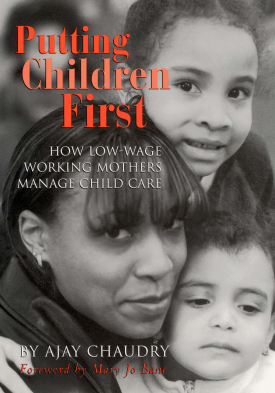
Putting Children First
About This Book
Semi-Finalist for the Robert F. Kennedy Memorial Book Award
In the five years following the passage of federal welfare reform law, the labor force participation of low-income, single mothers with young children climbed by more than 25 percent. With significantly more hours spent outside the home, single working mothers face a serious childcare crunch—how can they provide quality care for their children? In Putting Children First, Ajay Chaudry follows forty-two low-income families in New York City over three years to illuminate the plight of these mothers and the ways in which they respond to the difficult challenge of providing for their children’s material and developmental needs with limited resources.
Using the words of the women themselves, Chaudry tells a startling story. Scarce subsidies, complicated bureaucracies, inflexible work schedules, and limited choices force families to piece together care arrangements that are often unstable, unreliable, inconvenient, and of limited quality. Because their wages are so low, these women are forced to rely on inexpensive caregivers who are often under-qualified to serve the developmental needs of their children. Even when these mothers find good, affordable care, it rarely lasts long because their volatile employment situations throw their needs into constant flux. The average woman in Chaudry’s sample had to find five different primary caregivers in her child’s first four years, while over a quarter of them needed seven or more in that time.
This book lets single, low-income mothers describe the childcare arrangements they desire and the ways that options available to them fail to meet even their most basic needs. As Chaudry tracks these women through erratic childcare spells, he reveals the strategies they employ, the tremendous costs they incur and the anxiety they face when trying to ensure that their children are given proper care.
Honest, powerful, and alarming, Putting Children First gives a fresh perspective on work and family for the disadvantaged. It infuses a human voice into the ongoing debate about the effectiveness of welfare reform, showing the flaws of a social policy based solely on personal responsibility without concurrent societal responsibility, and suggesting a better path for the future.
AJAY CHAUDRY is a writer on social policy issues and a faculty and senior research fellow in urban policy and management at New School University.
